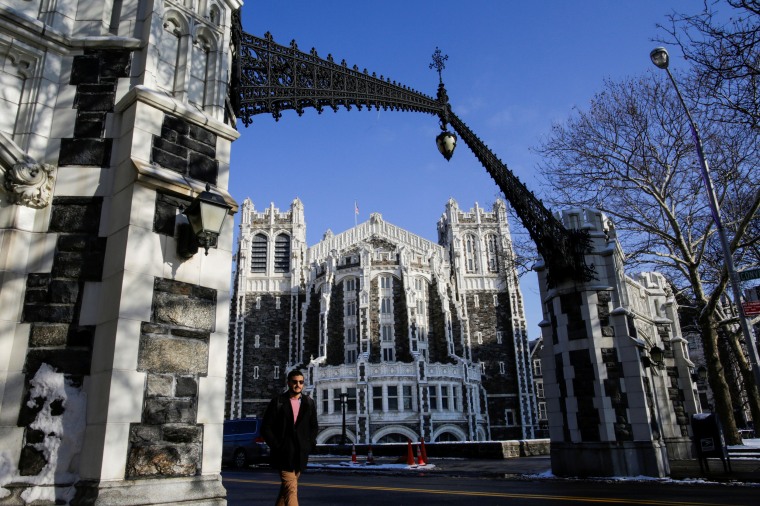WASHINGTON, D.C. — Dozens of students from Hispanic Serving Institutions, or HSIs — colleges and universities where at least 25 percent of the student body is Latino —are in Washington to push back against proposed Trump administration cuts and changes to several education programs the students say are crucial to obtaining future degrees.
While Latinos have seen substantial gains in college enrollment, the number of Hispanic students who graduate with a Bachelor’s degree continues to lag behind other groups, and access to resources to pay for college remains a key issue.
“I wouldn’t be able to be go to school without financial aid; it’s the reason I’m studying,” Adonis Galarza-Toledo, a student at California State University-San Bernardino, told NBC News. “My parents wouldn’t be able to afford the kind of money it takes to attend the school. Even though it has one of the lowest tuitions it is still pricey. Financial aid is a tool to get us to be productive citizens.”
More than half of Cal State-San Bernardino’s students are low income and nearly 70 percent receive federal Pell grants, which are awarded based on family income and financial need.
According to the non-profit group Institute for College Access & Success, slightly more than half of Latino college students nationwide rely on Pell grants to help pay for college. Like many of his fellow students, Galarza-Toledo grew up in a working-class Latino family. He says he plans to work for a non-profit community organization and even run for office one day.
The Trump administration’s Education Department budget proposal includes a drop of 12 percent — $8.5 billion — from the agency’s current disbursements and includes eliminating a program signed by then-President George W. Bush in 2007 that allows for non-profit and public sector employees to have their federal student loans cancelled after ten years of timely payments. Cancelling the program would affect an estimated 25 percent of U.S. workers.
“I think it’s important to be here to speak for those who can’t be here,” said Kelly Buehler, a business student from California. The federal National Center for Education Statistics finds that among full-time undergraduate students, a higher percentage of Hispanics (82 percent) receive grants compared to 74 percent for non-Hispanic whites. Among part-time undergraduate students, 58 percent of Latinos receive grants while 22 percent receive loans.
The Latino students were in the nation’s capital as part of the 24th annual Hispanic Association of Colleges and Universities (HACU) National Capitol Forum on Hispanic Higher Education, which brings together advocates for Latino higher education.
HACU represents over 470 Hispanic-serving colleges and universities in the U.S., Puerto Rico, Latin America, and Spain. While only thirteen percent of U.S. colleges and universities are are HSIs, yet they enroll two-thirds of all U.S. Hispanic college students.
“There’s nothing more dramatic than hearing the testimony of a student whose life has been changed by higher education because they received the kind of aid and support to fulfill their dreams,” said Félix Matos Rodríguez, president of Queens College of the City University of New York, where nearly half of the students are low income and more than half receive financial aid.
Gardenia García, 20, is a junior college student pursuing a public sector job in the criminal justice field. “I don’t see how I could continue going to school if they approve these cuts and I’m not the only one."
One of the White House budget proposals include eliminating subsidies on federal loans, meaning interest on the loans would continue to accrue while the student is in school which is currently not the case.
Communications student Gonzalo Cabada, the first person in his family to attend college, said he was hopeful that with Democrats in the House — who said they would fight the proposal — the changes wouldn't come to pass.
“But nothing is for sure and that’s why we’re here,” said Cabada.
FOLLOW NBC LATINO ON FACEBOOK, TWITTER AND INSTAGRAM.

